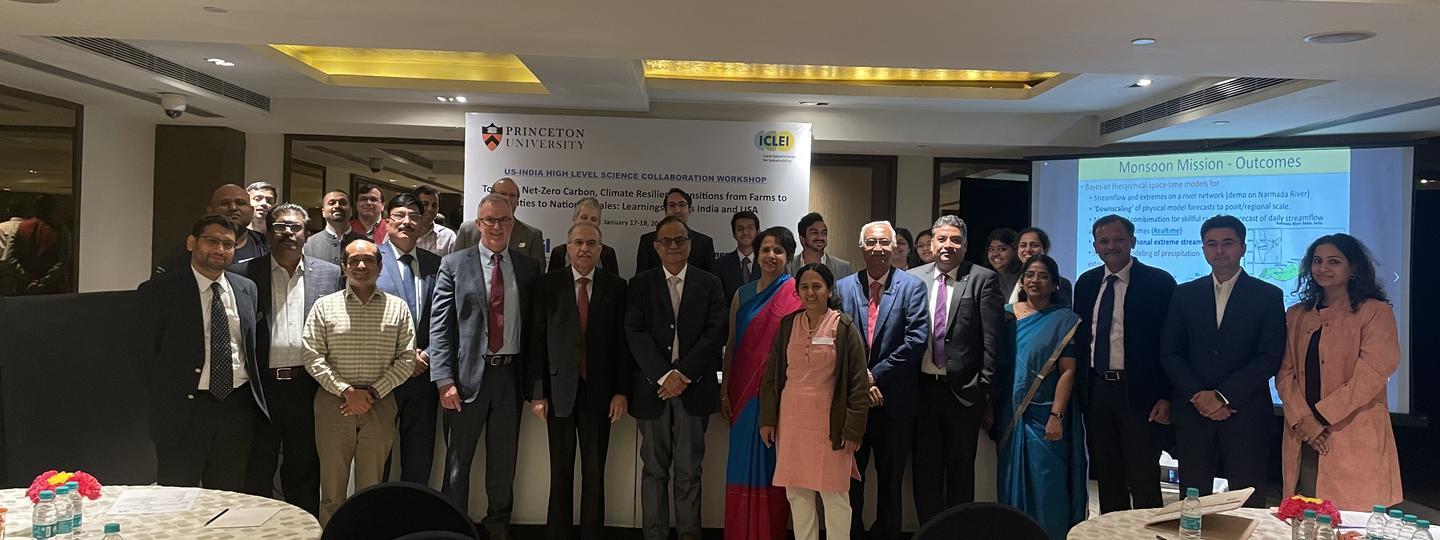U.S.-India science workshop celebrates innovation, explores zero-carbon future

In January, American and Indian scientists, policymakers and industry leaders convened in New Delhi, India, for a high-level workshop to address one of the most pressing issues of our time: getting to net-zero emissions.
“We’re still figuring out pathways to a climate-resilient, zero-carbon future, connecting innovations happening at the farm-, urban-, and macro energy-systems scale,” said Anu Ramaswami, the Sanjay Swani '87 Professor of India Studies; professor of civil and environmental engineering, the Princeton Institute for International and Regional Studies and the High Meadows Environmental Institute. Ramaswami, who is also the director of the M.S. Chadha Center for Global India, added: “The purpose of this workshop was to learn about these innovations across the U.S. and India and to discuss approaches to integrate these scales in future projects across the two countries.”
Ramaswami and Chris Greig, the Theodora D. '78 & William H. Walton III '74 Senior Research Scientist and lecturer in Princeton’s Department of Chemical and Biological Engineering and the Andlinger Center for Energy and the Environment, steered the workshop in collaboration with the Indian government’s Department of Science and Technology’s Dhananjay Tiwary. ICLEI USA and ICLEI South Asia, representing a global consortium of more than 2,500 local and regional governments worldwide, served as co-organizers. ICLEI USA and ICLEI South Asia are long-term project partners with Ramaswami’s Urban Nexus Lab.
Ashish Rao Ghorpade, deputy director of ICLEI South Asia, reiterated the importance of collaborative initiatives, given the enormity and urgency of the issue. “Collaborative initiatives that bring together academia, government and industry are important and relevant to bringing in change and future readiness,” he said. His anchor talk introduced sustainability-related infrastructure, decarbonization and climate-risk priorities for city planners in India and discussed the role of science-policy partnerships in developing actionable science for cities. “Indian cities are, on one hand, looking to international good practices and experiences and, at the same time, addressing local data, informality and capacity challenges,” he said. “The existing challenges need appropriate responses [given the] unique context, and learnings from U.S. cities are useful.”
The two-day workshop, supported in part by the National Science Foundation, opened with a keynote speech from pioneering physicist Ajay Kumar Sood, principal scientific adviser to the Government of India; he summarized India’s vision for “decarbonization with resilience.” Following that introduction, the U.S. delegation presented their remarks. Ramaswami shared her expectations for the workshop and spoke on opportunities for urban innovations. Grieg discussed Princeton’s Net-Zero America Project and specifically addressed macro-system energy models. Michigan State University professor Bruno Basso and University of Colorado professor Rajagopalan Balaji expounded on their research virtually; Brasso, on farm-level innovation, and Balaji, on climate risks.
The second day provided avenues for deeper discussion. Mark Zondlo, professor of civil and environmental engineering, explicated advanced technologies to assess air pollution; his colleague, Jyotirmoy Mandal, assistant professor of civil and environmental engineering, presented her research on mitigating heat stress in cities. Angie Fyfe, executive director of ICLEI USA, and Shweta Singh, assistant professor of agricultural, biological, environmental and ecological engineering at Purdue University spoke on city- and industry-level innovations. The workshop also served as a platform for up-and-coming scholars. Ganesh Hegde, postdoctoral research associate at the Andlinger Center for Energy and the Environment, and Princeton graduate students Neha Agarwal (civil and environmental engineering), Vivekandra Nemana (sociology), and Achinthya Sivalingam (School of Public and International Affairs) presented their work.
Inderjeet Singh, a graduate student at the School of Public and International Affairs and a midcareer officer in the Indian Administrative Services, reiterated collaborative opportunities in Indian cities. Speakers from a number of Indian institutions of higher education (Indian Institute Of Technology, Aziz Premji University); think tanks (Centre for Social and Economic Progress); industry (Nurture Farms, Google Research India, Tata Steel, Confederation of Indian Industry, Adani Group) and state government (Rajasthan, Tamil Nadu) echoed similar themes.
“We had rich participation from so many diverse stakeholders,” said Ramaswami.
The workshop’s closing session offered participants a forum to discuss next steps, and detailed planning for potential cross-country collaborations. “We hope to continue the conversations and look forward to developing joint projects where Indian and U.S. cities can share experiences and their issues can be targeted and highlighted,” Ghorpade said.
